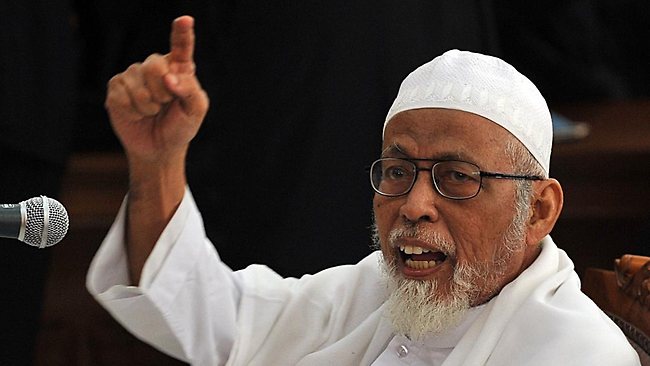Indonesia’s Coordinating Minister for Politics, Law and Security Wiranto yesterday announced that the government is still reviewing the release of Abu Bakar Bashir, despite previous announcements that President Joko Widodo had signed off on the firebrand cleric’s early parole for humanitarian reasons.
“The president understood [Bashir’s] family’s request on humanitarian grounds. But we certainly have to consider other aspects [of the release], like ideology, Pancasila, and other aspects regarding law,” Wiranto said at a press conference in Jakarta yesterday, as quoted by Tempo.
Bashir’s release, which was planned for this week, seemed to have been delayed after the 80-year-old refused to sign a statement confirming his allegiance to the Unitary State of Indonesia (NKRI) and the state ideology of Pancasila, which is one of the conditions for such a release. According to his attorneys, Bashir doesn’t think his allegiance to Islam is mutually exclusive to an allegiance to NKRI and Pancasila, therefore he doesn’t see the necessity in pledging his loyalty to the latter.
The Indonesian government’s sudden backtracking on Bashir’s release also seems to have been motivated by widespread international condemnation, particularly from Australia. Wiranto’s announcement yesterday came hours after Australian Prime Minister Scott Morrison publicly expressed his displeasure over Indonesia’s decision to release the man widely believed to responsible for the deaths of many Australians in the 2002 Bali bombing.
“Australians died horrifically on that night, and I think Australians everywhere would be expecting that this matter was treated with the utmost seriousness by our government, which it is,” Morrison said, as quoted by BBC.
“But also that the Indonesian government would show great respect for Australia in how they manage this issue.”
Bashir is known for being the spiritual leader to Jemaah Islamiyah, the regional terror group blamed for the deadly 2002 Bali bombing, which killed 202 people, but his conviction was overturned on appeal. He was sentenced to 15 years in prison in 2011 for providing support to a terrorist training camp in Aceh.
President Jokowi came under intense criticism for signing off on Bashir’s release, with many accusing the move to be heavily motivated by his bid for re-election in April. That Jokowi had political considerations in mind when freeing Bashir was heavily implied by Yusril Izra Mahendra, legal advisor for Jokowi’s re-election campaign, who said it was proof that Jokowi does not persecute or criminalize Indonesia’s ulema (Islamic religious scholars), as hardliner opposition figures often accuse him of doing.




